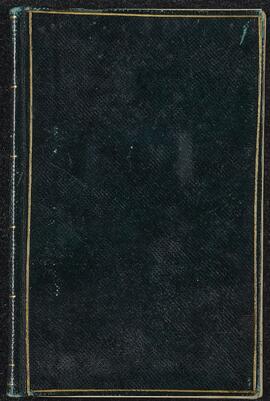Bound hardback volume containing a typescript entitled My Memories, written by Julia Cecilia Harris née Ryan and dedicated to her children and grandchildren, together with a card identifying the names of the memoir’s donors and date of donation. The title page of the volume is dated 17 March 1926 while the last page is dated 19 March 1926. A footnote on p. 8 suggests that the writing of the original manuscript was under way by 1925. In addition, some pages were added as an afterthought in 1927 before the document was bound. Typing is uniform throughout the text, including a much later dedication of January 1945, which reads ‘To Arthur [Arthur James Littledale], from Mummie [Mary Josephine Littledale née Harris] With all my love’. The uniformity of the typescript suggests that the document was typed and bound post 1945. There is also a handwritten dedication on a page preceding the title page ‘For my darling Christopher [Tugendhat], from his devoted Mother, Máire [Tugendhat née Littledale], grand-daughter of the author of these memories. And for his descendants.’ This dedication is dated 29 March 1972 and it is likely that the original manuscript was typed and bound by Máire Tugendhat in that year. The memoir, which narrates Julia Harris’s life events in considerable detail, provides exceptional insights into the life of the prosperous Roman Catholic middle class in Ireland in the second half of the nineteenth century, Ireland’s status as part of the British Empire and the violent events which led to its emergence as an independent nation in the early twentieth century.
Harris, Julia Cecilia née Ryan (1855-1933)Women--History
4 Archival description results for Women--History
Journal kept by Harriet Marshall née Swayne during a voyage from Allahabad, Uttar Pradesh, India with her two children to visit her in-laws in England and Ireland. The journal commences on 9 January 1847 with her arrival in Calcutta, where she spends the rest of the month waiting for the commencement of the next leg of her journey on board the vessel Alfred. While in Calcutta, she visits old friends and old scenes, having lived there eight years previously: ‘I had left Calcutta a child and returned a Woman and a Mother, how little had I fancied when I bade it farewell that I should return thus.’
The bulk of the journal is kept on board Alfred and contains descriptions of Harriet's fellow passengers, daily life on the vessel and the grinding monotony of long sea voyages. There are squabbles among children and endless quarrels among passengers, particularly women. Harriet herself becomes embroiled in a hostile exchange of words with the ship's captain, Edward Wall, who makes a derogatory comment about doctors, unaware that Harriet's husband is an army surgeon.
Remarkably, Harriet does not suffer from sea sickness even in the roughest of weathers, and has no patience for those who do. She does, however, regret having allowed herself ‘to be talked into taking a Cabin below [deck]’, where the air is stale as the port holes can only rarely be opened. She also regrets having chosen to travel by sea and concludes that ‘I will undergo any inconvenience & rough travelling rather than come back by sea to India[.] in an Overland trip there is something stirring every day, but here we breathe an impure atmosphere & when we do go upstairs it is only to walk up & down… nothing stirring but the ship’.
Alfred arrives on the island of Saint Helena on 30 March and the passengers get to enjoy a rare break on land. On 31 March they make an excursion around the island, which Harriet describes in great detail, including her disappointment at the shabby state of Napoleon Bonaparte's home. The journal ends with an entry made on 1 April as Alfred weighs anchor and leaves St Helena for England. Harriet's last lines read: ‘now I must go on with my Journal on sheets of Paper till we arrive in England.’ These loose sheets do not appear to have survived, and the fate of any of Harriet's other journals is unknown.
The journal is a useful research source for life in the service of the British Empire and the challenges of ocean travel. More broadly, it provides interesting insights into the lives of women and children in the nineteenth century and the societal mores that defined and separated the sexes.
Marshall, Harriet Susan née Swayne (1826-1909)The material consists of correspondence, speeches, press cuttings, photographs and taped interviews relating to Frances Condell’s political career; typescripts and drafts of poems, articles, short stories and stories for children; genealogical material and photographs relating to the Eades family; and assorted recordings. Collection highlights include letters signed by President John F. Kennedy, Senator Edward Kennedy and Mrs Lyndon B. Johnson, and correspondence with the American poet Beverley Githens Dresbach (1903-1971).
Condell, Frances née Eades (1916-1986), first female Mayor of LimerickLast page of a letter from James Butler, Roman Catholic Archbishop of Cashel to an unidentified group of gentlemen, urging them to exercise their vigilance and diligence 'to extirpate vice, & plant virtue & good morels [sic] that they may gain the Celestial Reward'. The missive incorporates a letter from Ellicebeth Swift addressed 'to all & every Clergymen [sic] in Care of souls within the Dioceses of Cashel & Emly', accusing them of ill treatment and threatening to make them 'dance & gallop in sich [sic] a manner that the Munster Lass in her Prime would not catch you till you pass the post at Mitchelstown' if they do not mend their ways. The letter constitutes a rare and useful account of relations between clergymen and parishioners within the Catholic Church in the archdiocese of Cashel and Emly from the female perspective.
Butler, James (c. 1683-1774), Roman Catholic Archbishop of Cashel